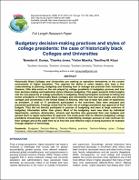Budgetary decision-making practices and styles of college presidents: the case of historically black Colleges and Universities

View/
Date
2014-05Author
Dumas, Brandon K
Chanika, Jones
Mbarika, Victior
Mayoka Kituyi, Geoffrey
Metadata
Show full item recordAbstract
Historically Black Colleges and Universities are seeking to reposition themselves in the current
environment of higher education. This requires the ability to select leaders who have a firm
understanding of planning, budgeting and knowing how to manage and promote their institutions.
However, little data exists on the role played by college presidents in budgetary process and how
their decision-making and leadership styles influence budgeting. This paper presents initial insights
into the role played by of college presidents in budgeting. Study participants consisted of sitting and
former presidents of Historically Black Colleges and Universities from four-year public and private
colleges and universities in the United States of America, who had at least two years of experience
as president. A total of 17 presidents participated in the interviews. Data were analyzed and
presented qualitatively. Findings reveal that the main role of college presidents was approval of final
budgets. They did not directly participate in process of budgeting and were at large receivers of
budgetary information rather than givers. Most of the budgetary work was done by individual
departments, sections, directorates, schools and faculties who generated their own budgets and
passed them to higher authorities for approval. The study posts that for effective budgeting, college
presidents should play a bigger role in terms of indentifying strategic avenues of new revenues for
their colleges and at the same time try to find new cost effective ways of doing business for example
through adoption of technology.
